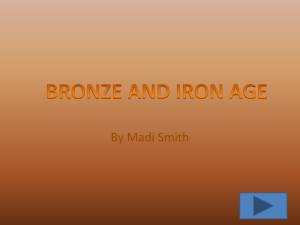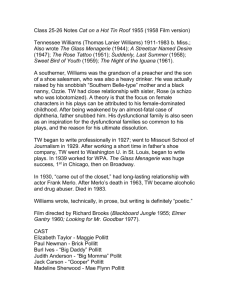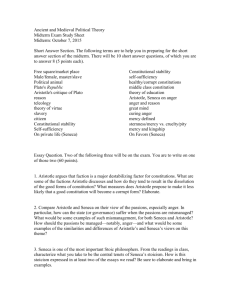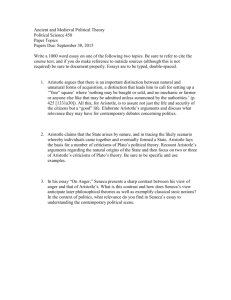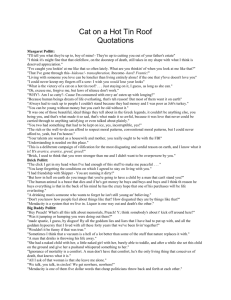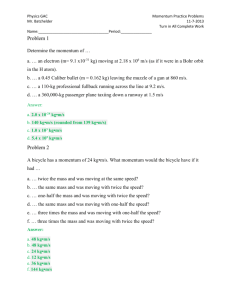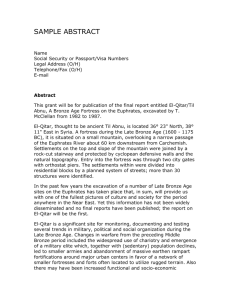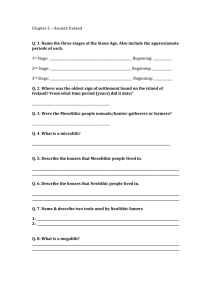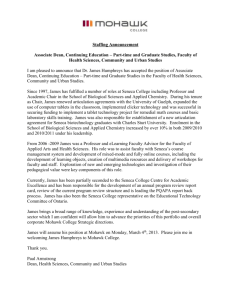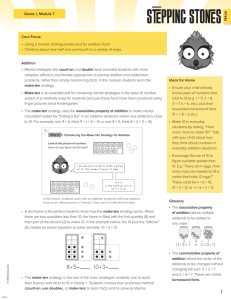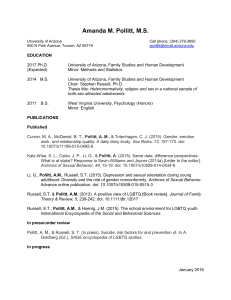Humanities 110: Final Exam
advertisement
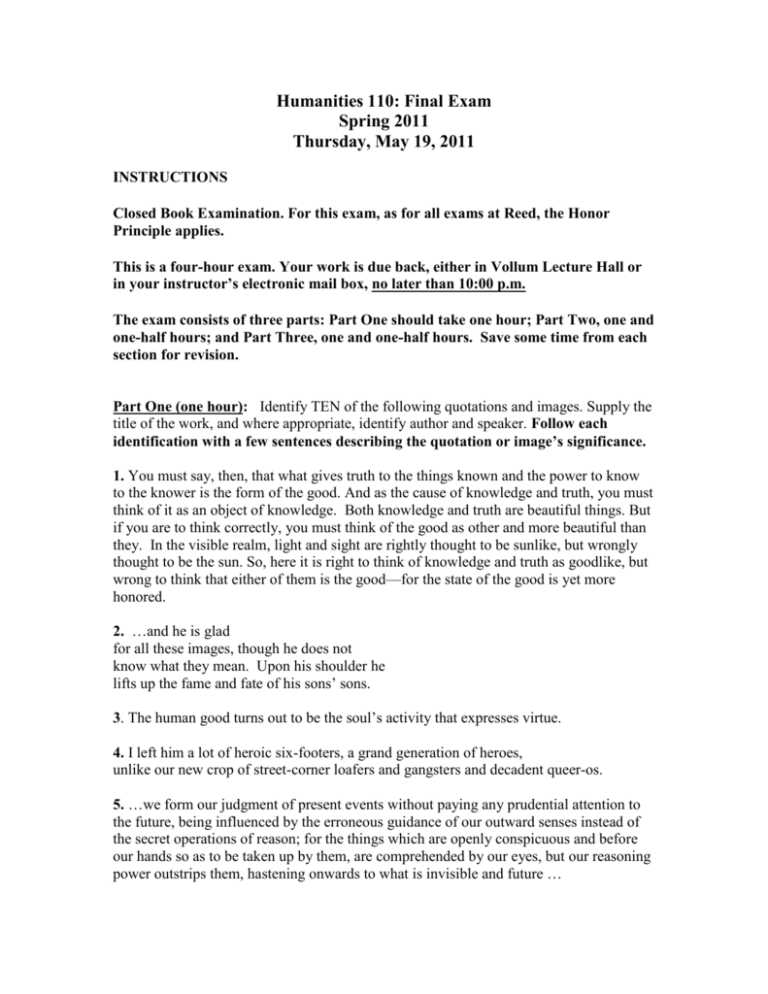
Humanities 110: Final Exam Spring 2011 Thursday, May 19, 2011 INSTRUCTIONS Closed Book Examination. For this exam, as for all exams at Reed, the Honor Principle applies. This is a four-hour exam. Your work is due back, either in Vollum Lecture Hall or in your instructor’s electronic mail box, no later than 10:00 p.m. The exam consists of three parts: Part One should take one hour; Part Two, one and one-half hours; and Part Three, one and one-half hours. Save some time from each section for revision. Part One (one hour): Identify TEN of the following quotations and images. Supply the title of the work, and where appropriate, identify author and speaker. Follow each identification with a few sentences describing the quotation or image’s significance. 1. You must say, then, that what gives truth to the things known and the power to know to the knower is the form of the good. And as the cause of knowledge and truth, you must think of it as an object of knowledge. Both knowledge and truth are beautiful things. But if you are to think correctly, you must think of the good as other and more beautiful than they. In the visible realm, light and sight are rightly thought to be sunlike, but wrongly thought to be the sun. So, here it is right to think of knowledge and truth as goodlike, but wrong to think that either of them is the good—for the state of the good is yet more honored. 2. …and he is glad for all these images, though he does not know what they mean. Upon his shoulder he lifts up the fame and fate of his sons’ sons. 3. The human good turns out to be the soul’s activity that expresses virtue. 4. I left him a lot of heroic six-footers, a grand generation of heroes, unlike our new crop of street-corner loafers and gangsters and decadent queer-os. 5. …we form our judgment of present events without paying any prudential attention to the future, being influenced by the erroneous guidance of our outward senses instead of the secret operations of reason; for the things which are openly conspicuous and before our hands so as to be taken up by them, are comprehended by our eyes, but our reasoning power outstrips them, hastening onwards to what is invisible and future … 6. Immediately the sentence was fulfilled against Nebuchadnezzar. He was driven away from human society, ate grass like oxen, and his body was bathed with the dew of heaven, until his hair grew as long as eagles' feathers and his nails became like birds' claws. When that period was over, I, Nebuchadnezzar, lifted my eyes to heaven, and my reason returned to me. I blessed the Most High, and praised and honored the one who lives forever. For his sovereignty is an everlasting sovereignty, and his kingdom endures from generation to generation. 7. 8. Yet I attach no great importance to how these and similar traditions will be criticized or valued. My wish is that each reader will pay the closest attention to the following: how men lived, what their moral principles were, under what leaders and by what measures at home and abroad our empire was won and extended; then let him follow in his mind how, as discipline broke down bit by bit, morality at first foundered; how it next subsided in ever greater collapse and then began to topple headlong in ruin—until the advent of our own age, in which we can endure neither our vices nor the remedies needed to cure them. 9. So they went out and fled from the tomb, for terror and amazement had seized them; and they said nothing to anyone, for they were afraid. 10. In your home everything had a price: and a truly sordid series of deals it was. Laws you passed, laws you caused to be put through in your interests, had never been formally proposed. You admitted this yourself. You were an augur, yet you never took the auspices. You were a consul, yet you blocked the legal right of other officials to exercise the veto. Your armed escort was shocking. You are a drink-sodden, sex-ridden wreck. Never a day passes in that ill-reputed house of yours without orgies of the most repulsive kind. 11. I know, my beautiful girl, why you run from me: A shaggy brow spreads right across my face From ear to ear in one unbroken line. Below is a Single eye, and above my lip is set a broad flat nose. Such may be my looks, but I pasture a thousand beasts, And I drink the best of the milk I get from them. 12. I know very well how Corinthian bronze originated. When Troy was sacked, Hannibal – a clever fellow and a real snake in the grass – piled all the bronze, gold, and silver statues into a single heap and set them on fire; they melted into a bronze alloy. From this amalgam craftsmen made little bowls, side dishes, and statuettes. Thus was Corinthian bronze born – neither this nor that, but one from all. 13. He tried to say “Alas!” – but no words came; He groaned – that was his voice; the tears rolled down On cheeks not his – all changed except his mind. Part Two (one and one-half hours): Write an essay on ONE of the following topics: 1. In what ways do Roman notions of masculinity or masculine virtue change during the period of the later Caesars in the first century CE? Using either Livy’s The Early History of Rome, Virgil’s Aeneid, or Sallust’s Catiline’s Conspiracy as a point of reference, discuss how both Seneca and Petronius reconfigure what it might mean to be male during the Neronian period. 2. Discuss the ways in which THREE of the following texts think about or represent slavery: Aristotle’s Politics, Seneca’s Essays and Letters, Paul’s First Letter to the Corinthians, Petronius’ Satyrica. Part Three (one and one-half hour): Write an essay on ONE of the following topics: 1. Many of the texts we've read this semester posit a "highest good" for the human being. Discuss the differences and similarities between the "highest goods" that THREE of the following authors posit: Aristotle, Plato, Lucretius, Cicero, Seneca, Paul, and Mark. Be sure to analyze the implications for each model of the good. 2. We've had numerous evil or, at least, vilified characters in texts this semester. Compare the depiction of THREE of the following characters – Catiline, Antony, Tarquin, Caligula (Gaius), Pyrgopolynices, Nebuchadnezzer, or Augustus – in terms of their "evil" nature. What makes each of these figures socially or morally unacceptable? What sorts of tensions or problems do they represent in the societies that they inhabit? Who benefits from their vilification? 3. In Art and Experience in Classical Greece, J.J. Pollitt defines the Hellenistic Age as "a period of psychological readjustment in which community life and the ideals of a circumscribed, familiar society lost much of its force. Cities like Alexandria and Antioch were in some ways like modern cities in which the ‘community’ has become so large that it has become impersonal. And in an impersonal urban environment each man is thrown back by necessity upon the world of his private experience. He dwells either on those experiences which are intensely personal or on those which are universal and general-that is, those which can be comprehended by all men without their having to be ‘conditioned’ by a particular culture.” (Pollitt 142) Compare one text from the Hellenistic era (the Pergamon Altar, a poem by Theocritus, the Book of Daniel, the Book of Maccabees, Polybius's Histories, or Plautus’ Swaggering Soldier) with one of the following: Aristotle's Nichomachean Ethics, Plato's Republic, or Aristophanes' Frogs. Assess whether Pollitt's sense of the psychological readjustment that occurred during the Hellenistic period helps account for the differences between the works or whether other factors are more significant.
